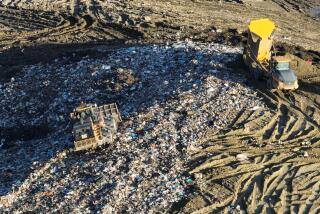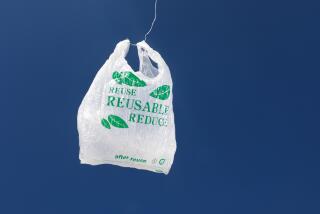Diaper Business Is Slipping
- Share via
Worried that disposable diapers were filling America’s landfills to their brims, many new parents signed up with diaper services in the early 1990s to do their bit for Mother Earth.
These days, that kind of political correctness seems to be out--along with diaper services.
“When people were concerned about the environment and what was going into the landfills, the diaper service was much more popular,” lamented James Nowakowski, owner of Santa Ana-based Tidy Didy diaper service, which serves Orange and San Diego counties. “Now, people just want convenience.”
Tidy Didy isn’t the only diaper service that is hurting. Scores of others have gone out of business across the nation, and those that survive are trying to compete by making their products more like disposables and expanding their services. Their travails illustrate how risky it can be to count on political winds blowing in one direction.
Just a few years ago diaper services were enjoying a rebirth of sorts.
The depleting ozone layer, vanishing rain forests and overburdened landfills were grabbing headlines in the late ‘80s and early ‘90s. As interest in saving the environment peaked, so did business at diaper services. Many parents turned to reusable cloth diapers in an attempt to conserve natural resources.
In the mid-’80s, the number of Americans who cited the environment as one of their top concerns hovered around 15%, then peaked at 23% in 1990, according to Roper Starch Worldwide. By 1994, the number dropped to 12%.
*
Business at diaper services increased by about 50% between 1988 and 1991, according to Kathy Mautz, spokeswoman for the National Assn. of Diaper Services. Since 1991, she said, business has decreased by about 25%, and membership in the association has fallen to 100 services from 150 five years ago.
In California, the number of diaper services has dropped from about 43 in 1990 to about 13 today, according to Joan Childs, director of the Diaper Service Marketing Council.
“I think people have lost their environmental interest,” said Childs, who is also the marketing manager for Tidy Didee diaper service in Sacramento. “Once folks put something out at the curbside, they think they’re done doing something for our planet.”
Childbirth educator Shirin Strauss said she has noticed a shift in parents’ priorities in recent years.
“People are still caring about the environment but they’re not getting as much social support to act on that caring, so convenience has become more important to them,” said Strauss, a staff instructor at Cedars-Sinai Medical Center in Los Angeles. “I’m certainly seeing a strong movement back toward disposables now, much more than in the past 10 years.”
Of course, manufacturers of disposable diapers have never conceded that their products are more taxing to the environment than cloth. Laundering cloth diapers, they point out, uses up energy and water supplies. And they say that fears about landfills overflowing with diapers were greatly exaggerated.
“There was a great misconception as to what kind of impact that disposable diapers had on the environment,” said Wendi Strong, spokeswoman for Kimberly-Clark Corp., maker of Huggies. “We worked very hard to try to educate people to the fact that disposable diapers really make up a very small amount of the total waste that’s deposited in our landfills.”
*
Today, more parents than ever use disposable diapers, according to the industry. Scott Stewart, public affairs manager for Procter & Gamble, maker of Pampers, said that more than 90% of parents use disposables exclusively, an all-time high.
Using a cloth diaper service is more expensive than buying disposables. Diaper services cost about $13 a week. The weekly cost for disposables is $7, according to the industry. But parents most often cite convenience as the major reason for choosing plastic.
Terri and Joshua Cain, a Marina del Rey couple, had intended to use cloth diapers on their daughter Caitlin because of concerns about the environment. But after trying it a few times, they changed their minds.
“I couldn’t do it,” said Terri Cain, a production manager at a Los Angeles printing company. “It’s just too messy. The disposables [are] a lot more convenient.”
Colleen Watson of Pasadena, who has used cloth diapers on each of her three children, concedes that it may be a bit of a hassle to tote around cotton diapers because they’re bigger than disposables and those dirty cotton cloths have to be carried back home. But in the long run, she said, that’s a small price to pay.
“We’ve never had any diaper rashes,” she said. “The environment is very important, so we just try to do the best we can with each little aspect.”
Many diaper services are adding new products and services to make cloth more convenient. Most offer cloth diaper-wraps with Velcro tabs so no pins are needed. And there is now an all-in-one diaper that eliminates the need for a separate diaper cover.
To attract more customers, Santa Ana-based Tidy Didy, which has seen its list of customers shrink from 8,500 in 1991 to about 4,000 today, has started a new linen service. In addition to diapers, parents can arrange for the company to collect and launder towels, bibs and sheets provided by Tidy Didy every week.
Sacramento-based Tidy Didee will soon expand to serve a different customer base by offering adult incontinence products.
“We’re finding there’s a whole new market there,” said Childs, marketing manager for the 42-year-old company. “We just are being a little bit more creative in offering different kinds of laundry services to stay afloat.”
At Dydee Diaper Service in Pasadena, the staff works closely with childbirth educators, lactation consultants and obstetric nurses to encourage expectant mothers to choose cloth.
“We try to educate them so they can educate the people that they come in contact with,” said marketing coordinator Lisa Ann Ganguin.
“It’s an uphill battle because every time you turn on the television you see a disposable diaper ad, every magazine you open there’s always two to three full-page ads,” she said. “It does seem like it’s harder and harder to get each customer.”
(BEGIN TEXT OF INFOBOX / INFOGRAPHIC)
Tidy Didy at a Glance
* Business: Diaper and baby linen laundry service
* Founded: 1946
* Headquarters: Santa Ana
* President: James Nowakowski
* Employees: 40
* Service area: Delivers to 4,000 households in Orange and San Diego counties
* 1995 sales: $4 million
* Diapers washed: 25,000 each day
* Other services: Delivers disposable diapers and baby wipes
Source: Tidy Didy
Researched by JANICE L. JONES / Los Angeles Times
More to Read
Inside the business of entertainment
The Wide Shot brings you news, analysis and insights on everything from streaming wars to production — and what it all means for the future.
You may occasionally receive promotional content from the Los Angeles Times.










